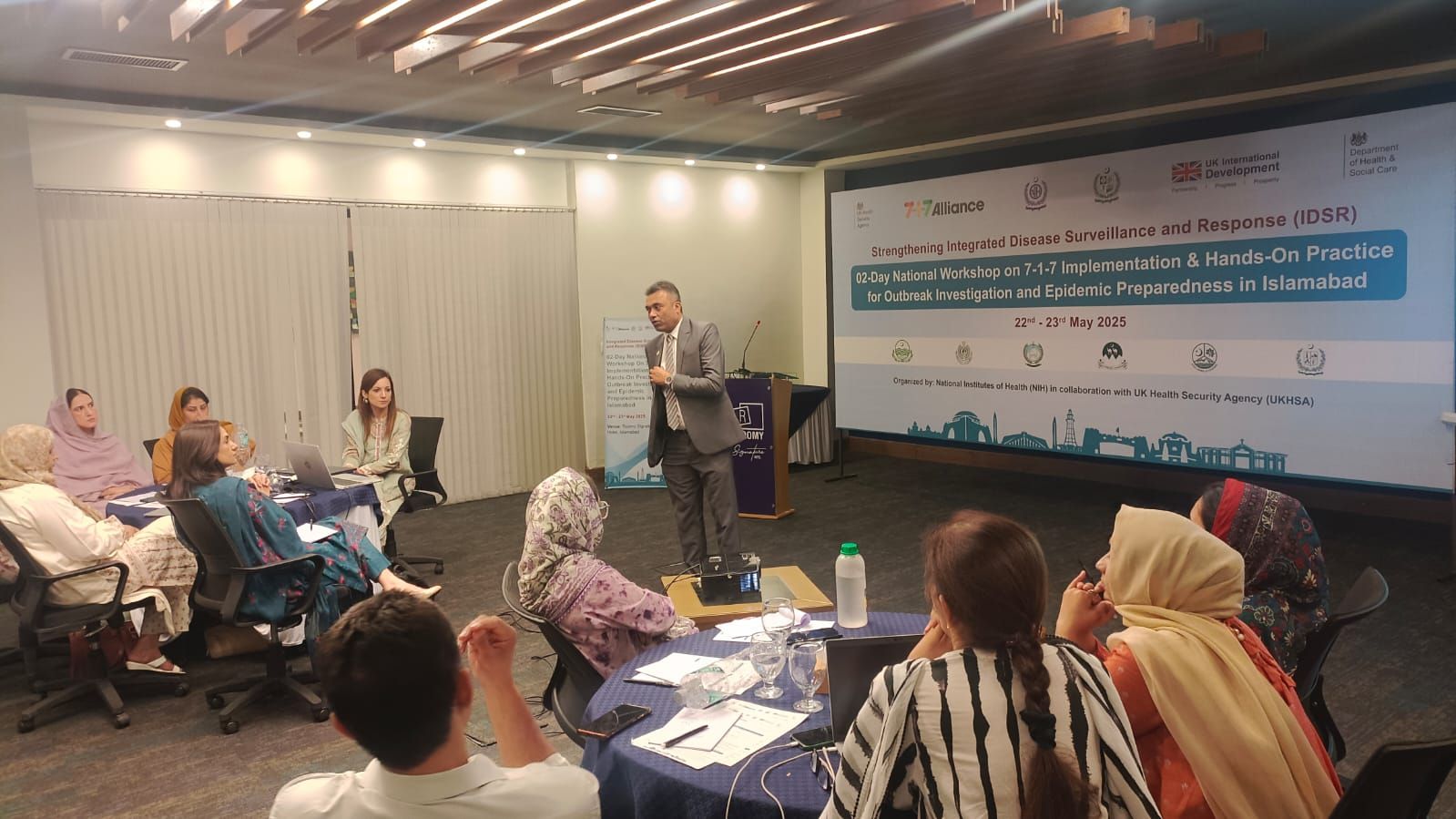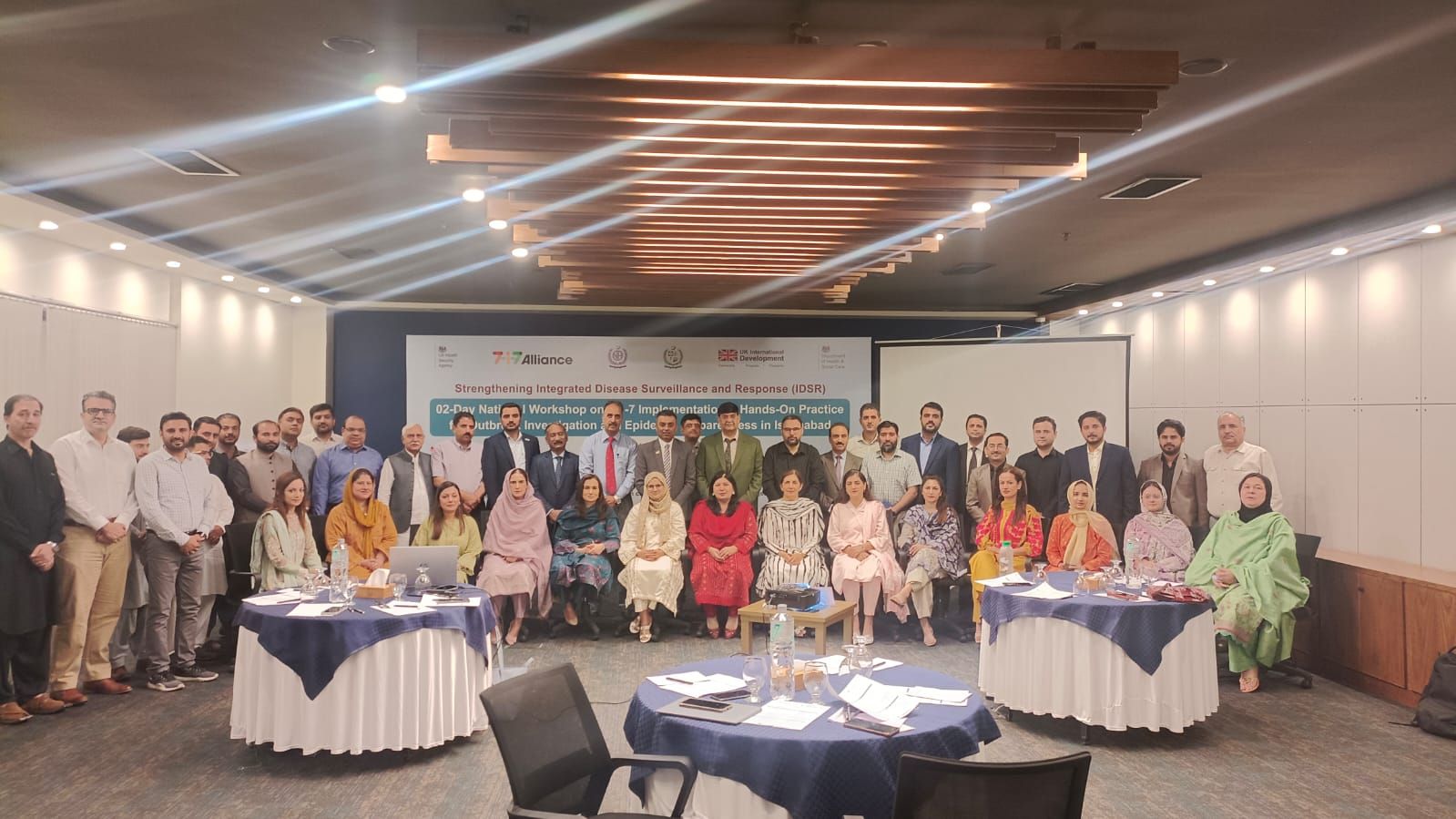
In a significant advancement for epidemic preparedness, the UK Health Security Agency (UKHSA) has collaborated with Pakistan’s National Institute of Health (NIH) and Resolve to Save Lives (RTSL) to strengthen Early Warning Alert and Response (EWAR) in Pakistan. A milestone workshop held over two days in May 2025 brought together key stakeholders to integrate the ‘7-1-7’ framework into Pakistan’s existing Integrated Disease Surveillance and Response (IDSR) system with the aim of improving outbreak detection, notification, and response.
The 7-1-7 Framework: a global standard for outbreak response
Developed by RTSL, the 7-1-7 framework sets clear metrics for effective outbreak response:
- Detect potential outbreaks within 7 days
- Notify relevant authorities within 1 day
- Respond with effective measures within 7 days.
This timeline-driven approach helps identify bottlenecks in public health systems and drives targeted performance improvements by linking detection, notification, and response into a single, measurable metric.
7-1-7 - explained
Workshop highlights
The workshop brought together 45 participants representing Pakistan’s national and provincial health departments, alongside international partners including WHO, US Centers for Disease Control and Prevention (US CDC), Jon Snow Inc (JSI), Johns Hopkins Program for International Education in Gynecology and Obstetrics, the Eastern Mediterranean Public Health Network (EMPHNET), the Food and Agriculture Organization (FAO) and the Global Fund.
Dr Muhammad Salman, CEO of the NIH, opened the workshop by acknowledging the pivotal role of UKHSA in strengthening Pakistan’s Integrated Disease Surveillance and Response (IDSR) system in operationalising the 7-1-7 strategy. Dr. Salman also highlighted the importance of aligning these efforts with broader goals of Global Health Security and compliance with the International Health Regulations (IHR), reinforcing Pakistan’s commitment to building a resilient and responsive health system.
Key sessions included:
- An introduction to the 7-1-7 framework, outlining the importance of identifying health threats within 7 days, notifying authorities within 1 day, and initiating a response within the next 7 days. This foundational overview helped participants understand how the framework integrates with existing surveillance systems.
- Applying the 7-1-7 framework to real-world scenarios, including outbreaks of measles, typhoid, scabies, and acute watery diarrhoea. These exercises allowed participants to assess current response timelines, identify practical challenges and evaluate system performance.
- Developing a standardised 7-1-7 tool for efficient and effective outbreak investigation, compatible with existing digital platforms mainly used in Pakistan such as DHIS-2. The tool aims to streamline outbreak tracking and improve accountability across health departments
- Collaborative group discussions and plenary sessions to develop actionable strategies to enhance early detection and response based on identified bottlenecks in the current surveillance and response systems, such as delayed reporting, resource constraints, and coordination gaps.
Collaborative leadership for resilient health systems
The national workshop exemplified strong institutional leadership and collaboration among key public health organisations. The NIH played a central role in organising and facilitating the event, whilst UKHSA IHR-SP provided critical technical support in training, digital integration, and aligning national efforts with the International Health Regulations (IHR 2005). WHO reaffirmed its ongoing support for enhancing early warning and response capacities, while other development partners contributed to shaping a unified strategy for implementing the 7-1-7 framework. This collective effort underscores a shared vision for building a more resilient and responsive public health infrastructure in Pakistan while contributing to global health security.
Looking forward: from framework to implementation
The integration of the 7-1-7 framework into Pakistan’s IDSR system marks a transformative shift toward a more accountable, data-driven, and responsive public health system. The successful completion of the workshop establishes a foundation for nationwide expansion and demonstrates how international technical partnerships can strengthen national health security while contributing to global epidemic preparedness goals.
Also By
- First-of-its-kind Community-Based Surveillance Training in Mardan to Boost Pakistan’s Disease Preparedness and response
- Emergency disease surveillance system in action for recurrent floods in Pakistan
- Expanding Sindh’s Integrated Disease Surveillance and Response Network (IDSR) Laboratory Network to private laboratories
Useful Resources
Related Articles
-
From vision to action: Sindh’s IDSR Lab Network Review marks key progress in Pakistan’s IDSR journey
BY Dr Muhammad Sartaj -
Gilgit-Baltistan launches new laboratory network in efforts to strengthen Integrated Disease Surveillance and Response across Pakistan
BY Dr Muhammad Sartaj, Sumera Abid -
Building a stronger health partnership with academic institutions for strengthening IHR in Pakistan: IDSR training for Master Trainers at The Institute of Public Health, Lahore
BY Dr Muhammad Sartaj -
Pioneering training on “District Health Information System-2” to strengthen Integrated Disease Surveillance and Response System in laboratories in Sindh province of Pakistan
BY IHR -
Expanding Sindh’s Integrated Disease Surveillance and Response Network (IDSR) Laboratory Network to private laboratories
BY Sumera Abid, Dr Muhammad Sartaj


Please Sign in (or Register) to view further.